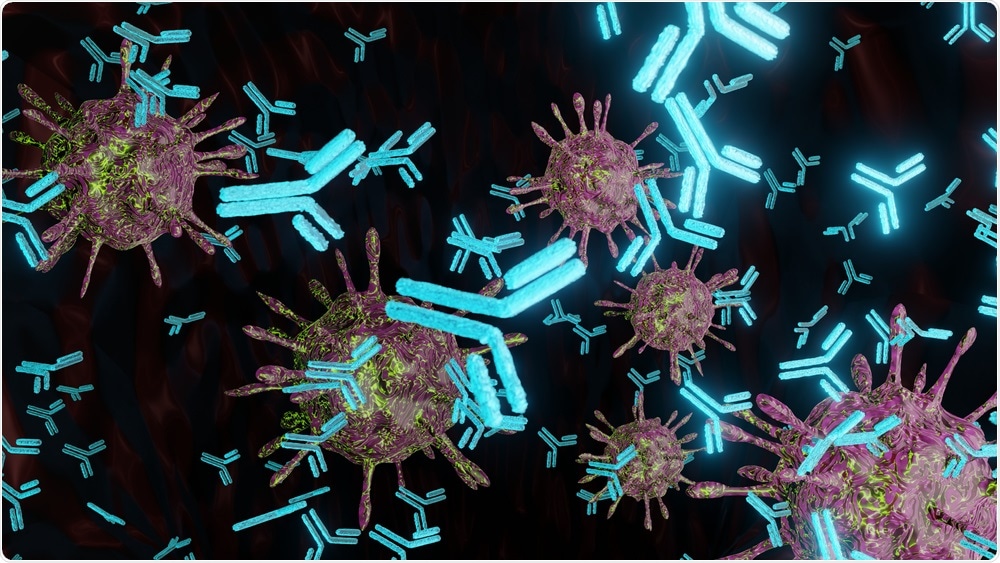The Middle East respiratory syndrome coronavirus (MERS-CoV), severe acute respiratory syndrome coronavirus (SARS-CoV), and SARS-CoV-2 all belong to the betacoronavirus family, the latter two belonging to the sarbecovirus subgenus. Despite sharing as much as 80% of their genome sequence, the antibodies produced against each virus in humans are distinct, with minimal cross neutralizing capacity.
All sarbecoviruses enter the cell via the angiotensin-converting enzyme 2 (ACE2) receptor. Notably, some antibodies still function against the highly conserved receptor-binding domain (RBD), though lingering SARS-CoV antibodies have proven insufficient in their ability to neutralize SARS-CoV-2.
 Study: Pan-Sarbecovirus Neutralizing Antibodies in BNT162b2-Immunized SARS-CoV-1 Survivors. Image Credit: LuXiFeR Bowlo / Shutterstock.com
Study: Pan-Sarbecovirus Neutralizing Antibodies in BNT162b2-Immunized SARS-CoV-1 Survivors. Image Credit: LuXiFeR Bowlo / Shutterstock.com
Introduction
The peak of the first SARS-CoV outbreak was in 2002-2003. Despite the fact that this virus was in circulation almost 20 years ago, several studies have shown that neutralizing antibodies against the virus in previously infected individuals can still be detected today.
In a paper recently published in The New England Journal of Medicine, the potency of neutralizing antibodies in individuals who have previously recovered from SARS-CoV and since received the Pfizer-BioNTech SARS-CoV-2 vaccine is tested against a number of sarbecoviruses. Some of the viruses that these antibodies were tested against include several SARS-CoV-2 variants of concern (VoCs), as well as three animal-borne viruses that may become zoonotic in the future.
Comparison of cross-neutralizing capacity
The researchers of the current study assembled five panels containing serum samples from ten patients who had previously been infected with either SARS-CoV or SARS-CoV-2, and subsequently been vaccinated or not. The final panel consisted of healthy volunteers who had also received both doses of the Pfizer-BioNTech vaccine at least 14 days prior to sample collection.
Antibodies were then collected from the participants and subsequently exposed to modified commercially available SARS-CoV and SARS-CoV-2 neutralization assays. Active B-cells in the sera were also quantified.
Prior to vaccination, disease naïve participants had no antibodies against either virus, while those who were previously infected experienced had high levels of antibodies. Following vaccination, both groups displayed significantly higher titers of antibodies against SARS-CoV-2, as well as mildly improved neutralizing capacity towards SARS-CoV-2 in a uniform manner, regardless of baseline levels.
To further probe the sarbecovirus neutralization capacity of the Pfizer-BioNTech vaccine and the influence of past sarbecovirus exposure, the group selected six additional viruses to test the antibodies against. These included the Alpha, Beta, and Delta SARS-CoV-2 VoCs, as well as bat coronavirus RaTG13, and pangolin coronaviruses GD-1 and GX-P5L, and two SARS-CoV variants of bat WIV1 and RsSHC014.
In all cases, the only group that showed cross-neutralization capacity towards a virus without previous exposure was those previously infected with SARS-CoV and later vaccinated against SARS-CoV-2. Those with prior SARS-CoV-2 exposure and subsequent vaccination showed the greatest neutralization capacity towards wild-type SARS-CoV-2 and its VoCs. However, this group still showed lower neutralizing antibody levels against SARS-CoV as compared to did those with past SARS-CoV exposure and no vaccine towards SARS-CoV-2.
The researchers also found that upon fluorescent staining, B-cells that bind with the RBDs from both SARS-CoV and SARS-CoV-2 were also only present in SARS-CoV-2 vaccinated individuals with a history of SARS-CoV.
Prime-boost vaccination
The current study findings suggest that past SARS-CoV exposure “primes” an individual to produce antibodies. Additionally, subsequent vaccination appears to act as a booster, resulting in broad spectrum sarbecovirus neutralization activity.
The authors of this study intend to further explore the effect observed here in reverse by providing a SARS-CoV RBD-specific vaccine to those with prior SARS-CoV-2 exposure. The researchers hope that this work will potentially address whether serial administration of messenger ribonucleic acid (mRNA) and whole-virus vaccines could play a role in the development of a future broad-spectrum vaccination regimen.
Generally, immunodominant antibodies towards the RBD or other key regions of a virus, as produced by the SARS-CoV-2 vaccines, tend to generate the greatest effect in neutralizing the specific virus in question. However, the ability to induce a wider range of antibodies targeting the membrane and nucleocapsid proteins, as well as the spike protein in a supplementary manner, may prove more effective, particularly against similar but non-identical viruses.
Journal reference:
- Tan, C., Chia, W., Young, B. E., et al. (2021). Pan-Sarbecovirus Neutralizing Antibodies in BNT162b2-Immunized SARS-CoV-1 Survivors. The New England Journal of Medicine. doi:10.1056/NEJMoa2108453.